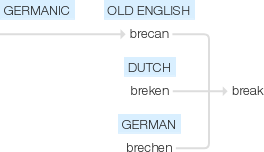Break
Old English brecan (verb), of Germanic origin; related to Dutch breken and German brechen, from an Indo-European root shared by Latin frangere ‘to break’.
wiktionary
From Middle English breken, from Old English brecan(“to break”), from Proto-West Germanic *brekan, from Proto-Germanic *brekaną(“to break”), from Proto-Indo-European *bʰreg-(“to break”). The word is a doublet of bray.
Clipping of breakdown(the percussion break of songs chosen by a DJ for use in hip-hop music) and see also breakdancing.
etymonline
break (v.)
Old English brecan "to divide solid matter violently into parts or fragments; to injure, violate (a promise, etc.), destroy, curtail; to break into, rush into; to burst forth, spring out; to subdue, tame" (class IV strong verb; past tense bræc, past participle brocen), from Proto-Germanic *brekanan (source also of Old Frisian breka, Dutch breken, Old High German brehhan, German brechen, Gothic brikan), from PIE root *bhreg- "to break."
Closely related to breach (n.), brake (n.1), brick (n.). The old past tense brake is obsolete or archaic; past participle is broken, but shortened form broke is attested from 14c. and was "exceedingly common" [OED] 17c.-18c.
Of bones in Old English. Formerly also of cloth, paper, etc. Meaning "escape by breaking an enclosure" is from late 14c. Intransitive sense "be or become separated into fragments or parts under action of some force" is from late 12c. Meaning "lessen, impair" is from late 15c. Meaning "make a first and partial disclosure" is from early 13c. Meaning "destroy continuity or completeness" in any way is from 1741. Of coins or bills, "to convert to smaller units of currency," by 1882. In reference to the heart from early 13c. (intransitive); to break (someone's) heart is late 14c.
Break bread "share food" (with) is from late 14c. To break ground is from 1670s as "to dig, plow," from 1709 in the figurative sense "begin to execute a plan." To break the ice "overcome the feeling of restraint in a new acquaintanceship" is from c. 1600, in reference to the "coldness" of encounters of strangers. Break wind first attested 1550s. To break (something) out (1890s) probably is an image from dock work, of freeing cargo before unloading it.
The ironic theatrical good luck formula break a leg (by 1948, said to be from at least 1920s) has parallels in German Hals- und Beinbruch "break your neck and leg," and Italian in bocca al lupo. Evidence of a highly superstitious craft (see Macbeth). According to Farmer & Henley, in 17c. the expression was used euphemistically, of a woman, "to have a bastard."
break (n.)
c. 1300, "act of breaking, forcible disruption or separation," from break (v.). Sense in break of day "first appearance of light in the morning" is from 1580s; meaning "sudden, marked transition from one course, place, or state to another" is by 1725. Sense of "short interval between spells of work" (originally between lessons at school) is from 1861. Meaning "stroke of luck" is attested by 1911, probably an image from billiards (where the break that scatters the ordered balls and starts the game is attested from 1865). Meaning "stroke of mercy" is from 1914. Jazz musical sense of "improvised passage, solo" is from 1920s. Broadcasting sense is by 1941.
